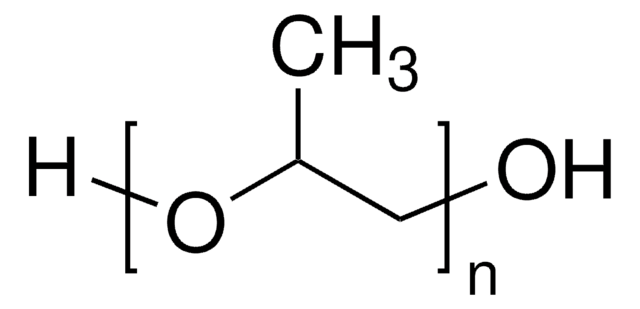W294004
Propylene glycol
≥99.5% (GC), FCC, FG
Synonym(s):
1,2-Propanediol, Propylene glycol
About This Item
Fragrance grade
Halal
Kosher
Recommended Products
biological source
synthetic
Quality Level
grade
FG
Fragrance grade
Halal
Kosher
Agency
follows IFRA guidelines
reg. compliance
EU Regulation 1223/2009
EU Regulation 1334/2008 & 178/2002
FCC
FDA 21 CFR 175.300
FDA 21 CFR 175.320
FDA 21 CFR 176.180
FDA 21 CFR 176.210
FDA 21 CFR 184.1666
vapor density
2.62 (vs air)
vapor pressure
0.08 mmHg ( 20 °C)
Assay
≥99.5% (GC)
form
viscous liquid
autoignition temp.
779 °F
expl. lim.
12.5 %
refractive index
n20/D 1.432 (lit.)
bp
187 °C (lit.)
mp
−60 °C (lit.)
density
1.036 g/mL at 25 °C (lit.)
application(s)
flavors and fragrances
Documentation
see Safety & Documentation for available documents
food allergen
no known allergens
fragrance allergen
no known allergens
Organoleptic
odorless
SMILES string
CC(O)CO
InChI
1S/C3H8O2/c1-3(5)2-4/h3-5H,2H2,1H3
InChI key
DNIAPMSPPWPWGF-UHFFFAOYSA-N
Looking for similar products? Visit Product Comparison Guide
Related Categories
General description
Application
- Fatally impaired glucose digestion by propylene glycol in Aedes aegypti (Diptera: Culicidae) and co-formulation with terpenoids for enhancing attractive toxic sugar baits.: This study explores the application of propylene glycol in impairing glucose digestion in mosquitoes, offering a novel approach to vector control through enhanced toxic sugar baits. The synergy with terpenoids broadens its impact, marking significant progress in pest management strategies (Maes et al., 2024).
- Null cross-modal effects of olfactory training on visual, auditory or olfactory working memory in 6- to 9-year-old children.: This neuroscientific study utilizes propylene glycol in olfactory training exercises, investigating its potential to influence cross-modal sensory processing. Despite null findings, it provides a critical assessment of sensory integration therapies (Pieniak et al., 2024).
- Propylene glycol toxicity in an adolescent secondary to chronic cornstarch ingestion.: This medical case study addresses the risks associated with excessive propylene glycol intake, highlighting its potential toxic effects. The study serves as a crucial reminder of the need for regulatory scrutiny and public awareness regarding chemical additives in food products (Downey et al., 2024).
Storage Class Code
10 - Combustible liquids
WGK
WGK 3
Flash Point(F)
217.4 °F - closed cup
Flash Point(C)
103 °C - closed cup
Personal Protective Equipment
Choose from one of the most recent versions:
Already Own This Product?
Find documentation for the products that you have recently purchased in the Document Library.
Customers Also Viewed
Our team of scientists has experience in all areas of research including Life Science, Material Science, Chemical Synthesis, Chromatography, Analytical and many others.
Contact Technical Service


